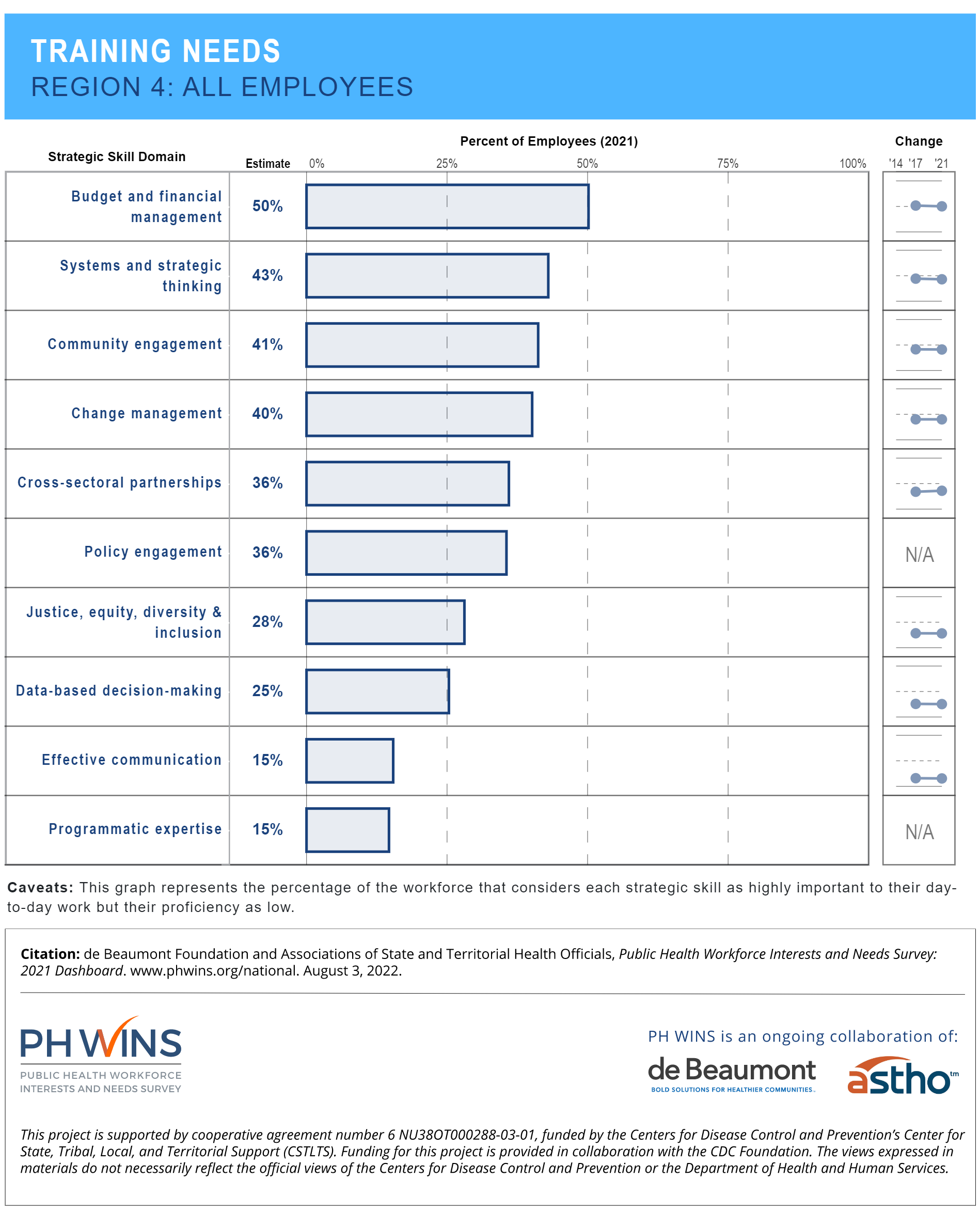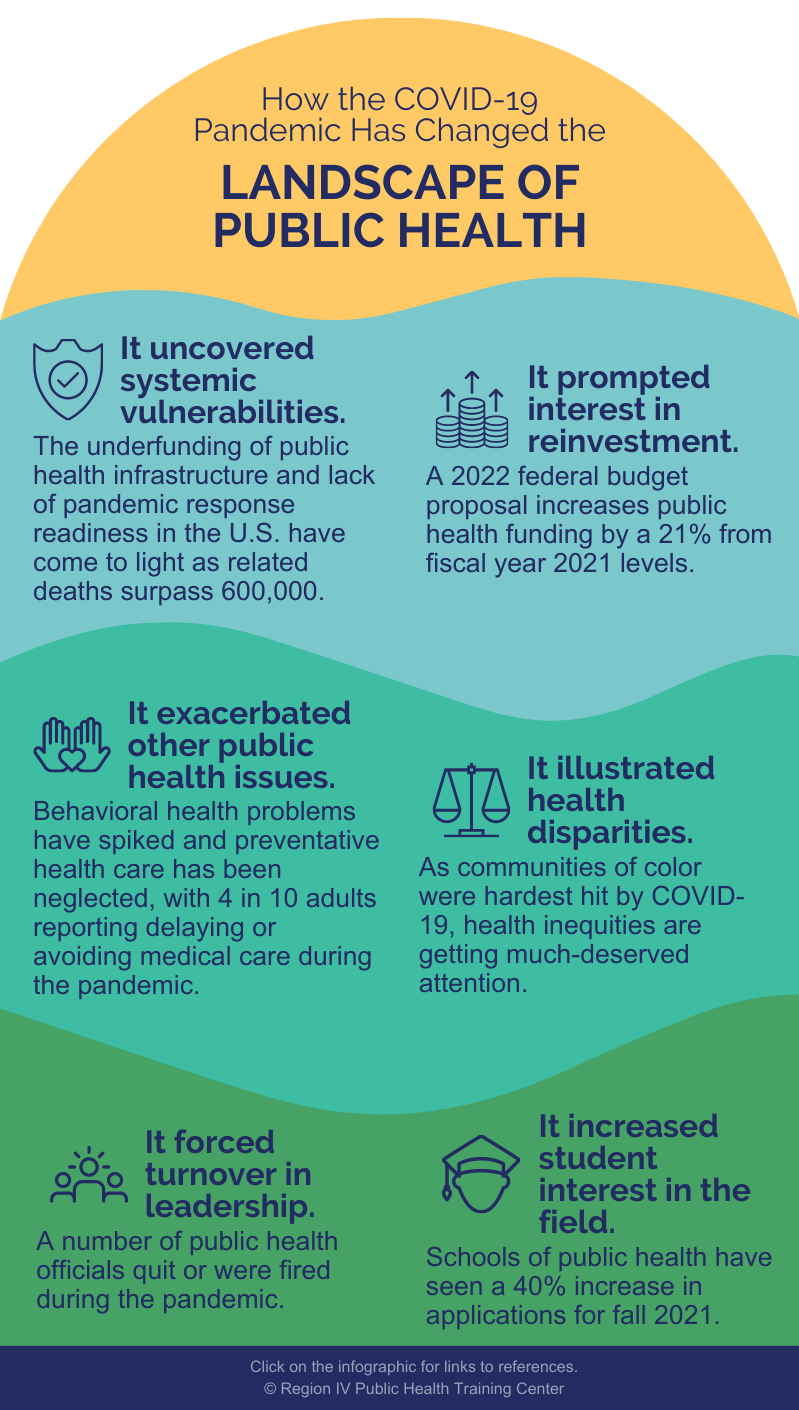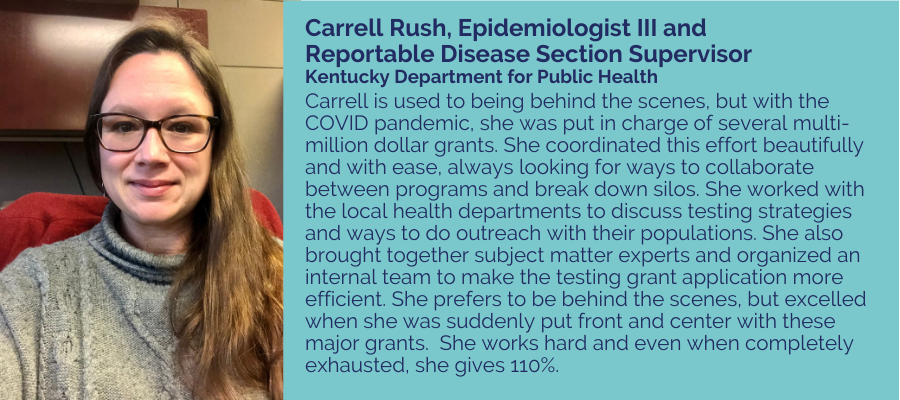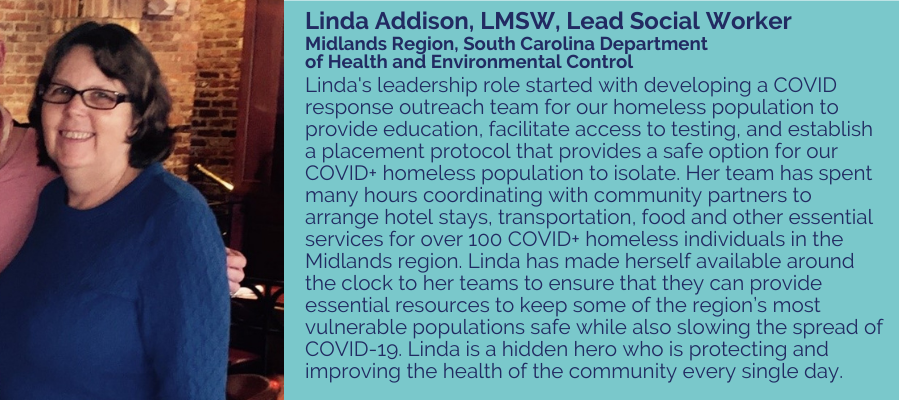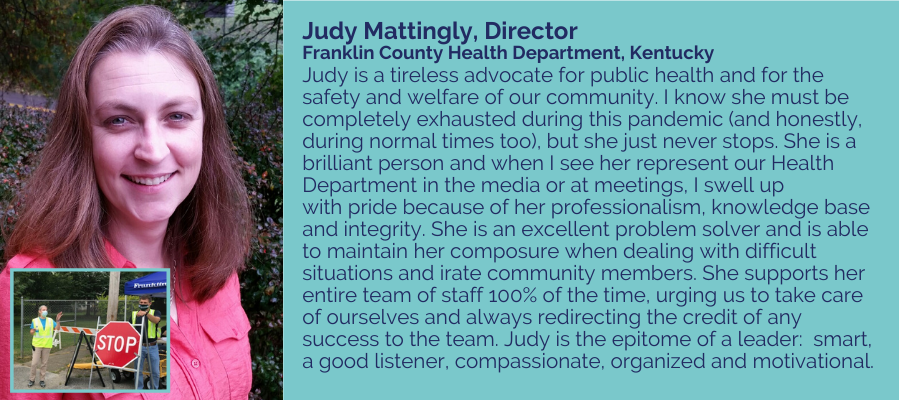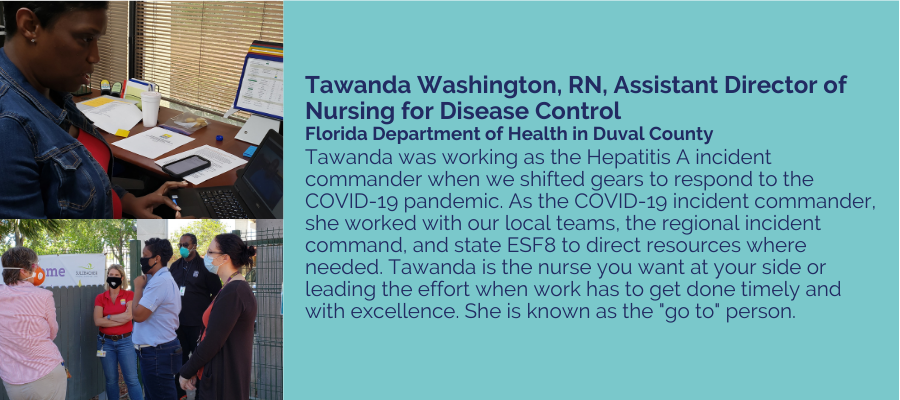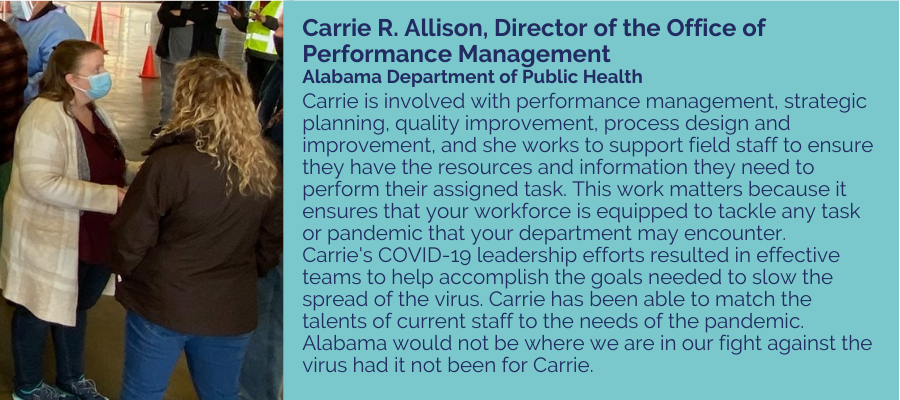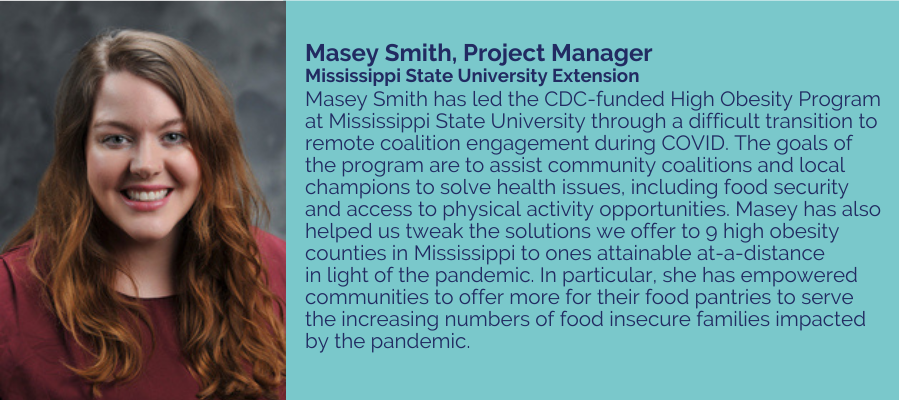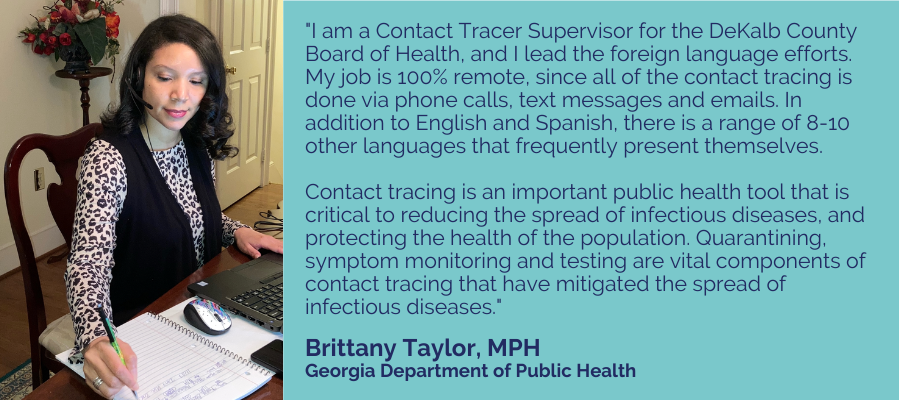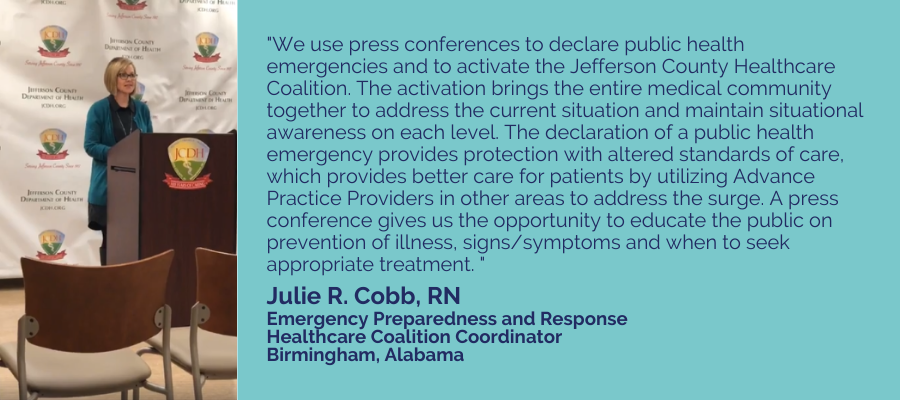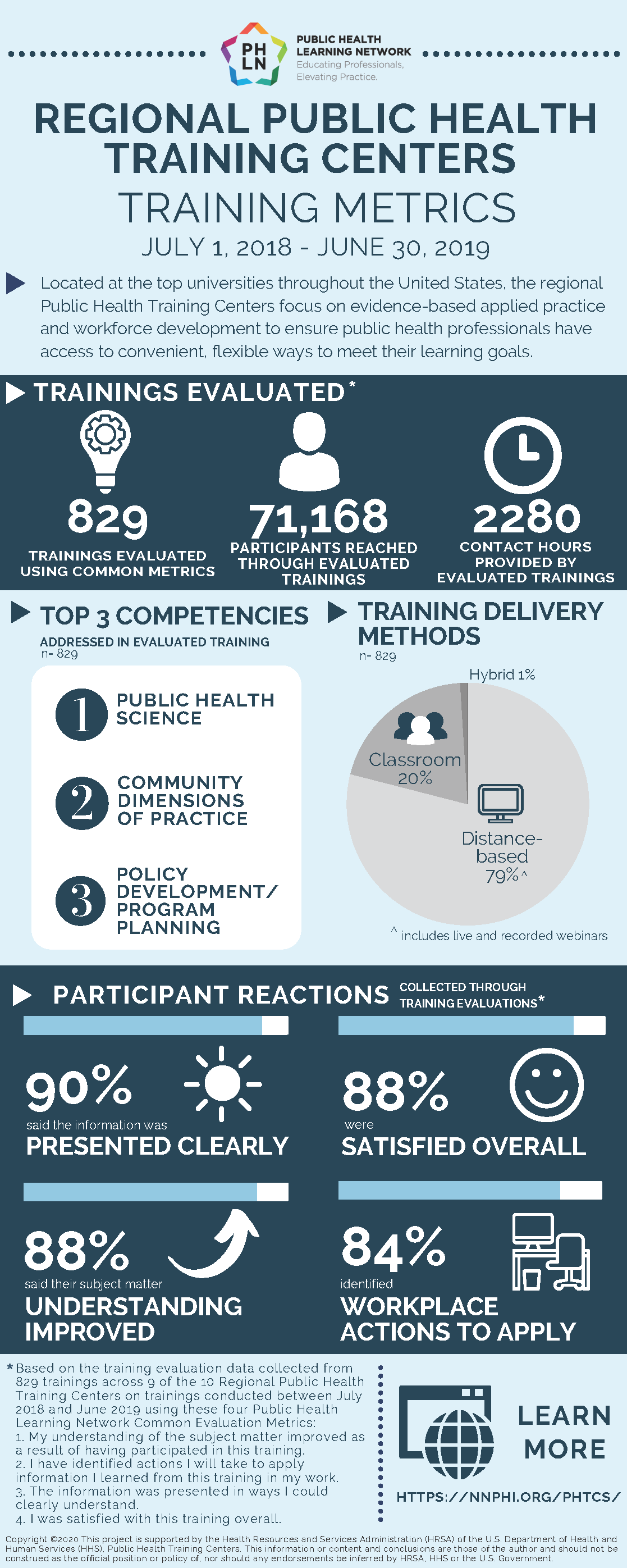
by R-IV PHTC | Apr 26, 2024 | News
2024-2025 Public Health & Primary Care (PHPC) Leadership Institute
Are you an emerging leader at a state or local health department, tribal health organization, or FQHC/FQHC Look-Alike?
Program Overview
The Region IV Public Health Training Center, headquartered at Emory University, has partnered with the J.W. Fanning Institute for Leadership Development at the University of Georgia to offer the Region IV Public Health & Primary Care (PHPC) Leadership Institute. With funding from the Health Resources and Services Administration (HRSA), the PHPC Leadership Institute provides training for individuals from the eight states that comprise the U.S. Department of Health and Human Services (HHS) Region IV (Alabama, Florida, Georgia, Kentucky, Mississippi, North Carolina, South Carolina, and Tennessee). There is no fee to participate.
The PHPC Leadership Institute is an 8-month experience providing 40 contact hours of interaction. The Institute consists of a virtual orientation; an in-person opening retreat; 5 virtual sessions lasting 2 hours each; and a final virtual 3-hour graduation session. In addition to these sessions, participants will be asked to complete approximately 2-3 hours of intersession work between the virtual sessions. Zoom video conferencing technology will be used for the virtual sessions.
Who Should Apply
Emerging public health and primary care leaders who:
- Work in governmental state, local, or tribal public health departments, tribal health organizations, or FQHCs/FQHC Look-Alikes
- Work in one of the following states: Alabama, Florida, Georgia, Kentucky, Mississippi, North Carolina, South Carolina, or Tennessee
- Manage programs, supervise staff, and/or demonstrate leadership potential
- Work with underserved populations and/or are from under-resourced health departments or FQHCs/FQHC Look-Alikes
“The Region IV Public Health and Primary Care Leadership Institute (PHPC-LI) was a terrific experience for diverse multidisciplinary cohort members to engage in various modalities of learning experiences, both in-person and virtually. The curriculum delivery was dynamic and thoughtful, and allowed for deepening one’s scope of leadership knowledge and self-awareness of strengths…I’m so pleased the PHPC-LI included me as their first ever Family Leader to broaden the diversity of the group…”
– Linda Starnes,
2022-2023 PHPC-LI Fellow
Program Learning Objectives
By the end of the Institute, participants will be able to:
-
- Identify personal leadership strengths
- Address a leadership challenge through a self-directed adaptive approach
- Engage in peer consulting with Region IV colleagues
- Apply leadership competencies in the context of public health
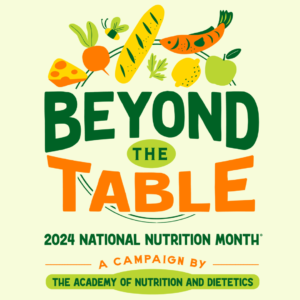
by R-IV PHTC | Mar 6, 2024 | News
 National Nutrition Month® reminds us to consider the impact of our food choices on our health and the environment. The theme “Beyond the Table” encourages us to look at the broader implications of what we eat and drink. Our daily food choices play a significant role in shaping our well-being and the sustainability of our planet. However, it is essential to acknowledge that access to nutritious food can be a challenge for some individuals and communities.
National Nutrition Month® reminds us to consider the impact of our food choices on our health and the environment. The theme “Beyond the Table” encourages us to look at the broader implications of what we eat and drink. Our daily food choices play a significant role in shaping our well-being and the sustainability of our planet. However, it is essential to acknowledge that access to nutritious food can be a challenge for some individuals and communities.
Food insecurity, defined as limited or uncertain access to adequate food, is common and is associated with higher rates of poor nutrition and increased risk for chronic diet-related conditions such as diabetes, obesity, heart disease, and mental health disorders. According to the National Institute on Minority Health and Health Disparities (NIH), almost 15 percent of U.S. households in 2020 were considered food insecure at some point, meaning not all household members were able to access enough food to support an active, healthy lifestyle. Nearly half of those households included children.
Addressing limited access to nutritious food options requires collective action and support systems. The public health arena recognizes food insecurity and poor nutrition as health issues. It is partnering with food and nutrition organizations, such as the U.S. Department of Agriculture (USDA), to develop programs and resources to improve access to nutritious foods and promote food equity. Initiatives such as community gardens, food banks, and educational programs can help empower individuals to make healthier food choices despite constraints.
By advocating for policies that promote food equity and investing in local food systems, we can work towards a future where everyone has the opportunity to nourish themselves in a sustainable way. National Nutrition Month® reminds us that we can create a healthier, more equitable future for all by coming together to address these challenges.
Click the link for information on Food Assistance Programs through the USDA in your community.
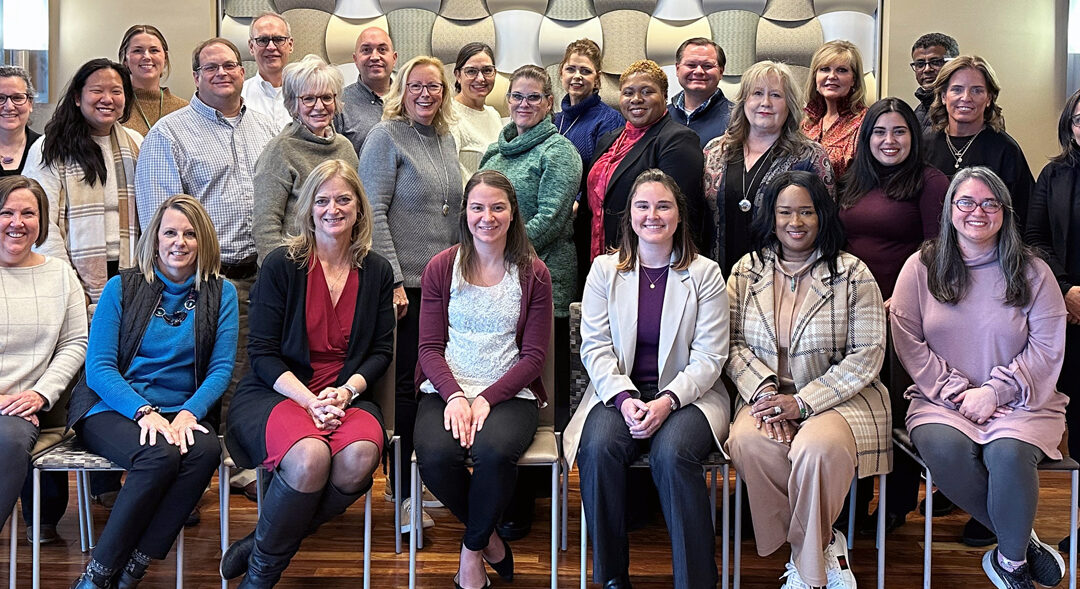
by Tara Poole | Feb 5, 2024 | News
The Region IV Public Health Training Center (PHTC) recently hosted a meeting in Atlanta for members of its Steering Committee. The committee met to discuss priorities and challenges within the populations they serve, ways to strengthen connections between the Region IV PHTC and state health departments, and opportunities to expand the PHTC’s reach to underserved areas to advance health equity. In addition, the group discussed ways to engage new audiences and partners, specifically during student field placements, training, and leadership institutes.
Representing a diversity of public health perspectives, the role of the Steering Committee is to share information on the training needs of their workforce, speak on behalf of their organizational partners and underserved populations, provide content expertise, and share guidance on Region IV PHTC’s activities.
Members of the Steering Committee include representatives from across the Region IV PHTC network of eight southeastern states, including local, state, federal, and tribal public health organizations and academia. The Committee also includes staff from the Region IV PHTC Central Office as well as from its Community-Based Training Partners and Technical Assistance Partners.
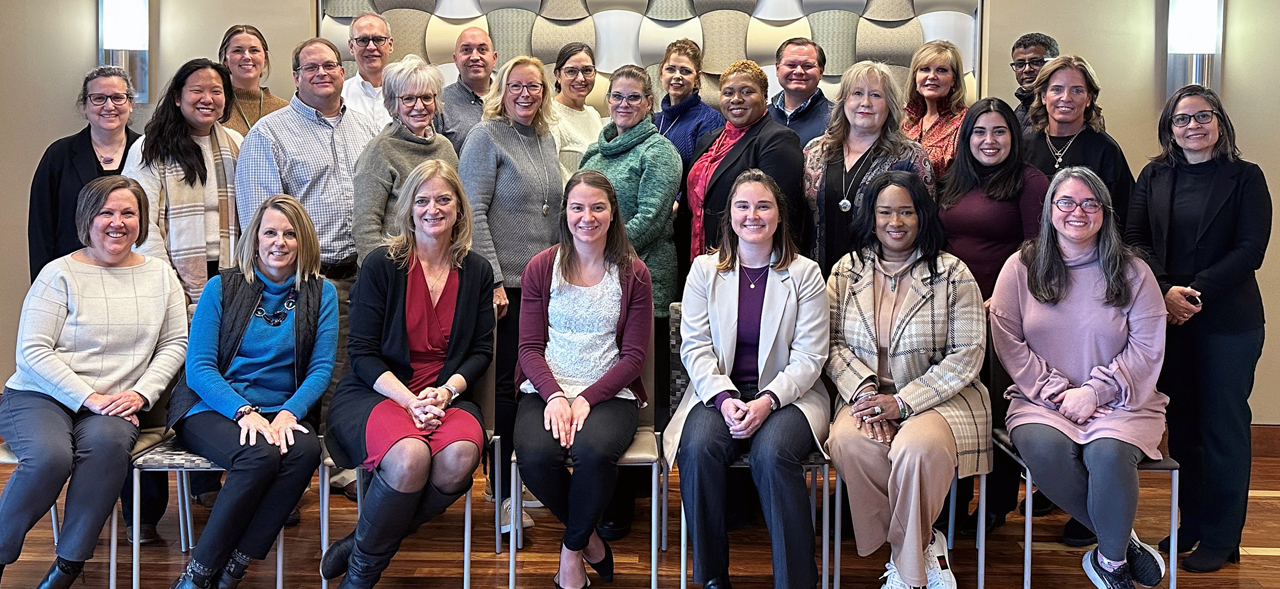
Pictured (front row, left to right): Lisa McCormick, Debra Bragdon, Laura Lloyd, Elena Kidd, Sophia Lamb, Tiffaney Brown, and Taylor Dula. Second row (left to right): Moose Alperin, Deanna Zhong, Matt Fifolt, Kim Dittmann, Cynthia Lamberth, Susan Haynes Little, JacKetta Cobbs, Brandy Walker, Parnia Roghani, Erin Mundy, and Carolina Darbisi. Back row (left to right): Elizabeth Kidwell, Ken Harrison, Ryan Easterling, Janie Cambron, Anne Maynard Wenders, Matthew Coleman, Angie Gainey, and Mulugeta Gebregziabher. Not pictured is Becky Reamy.

by R-IV PHTC | Jun 1, 2023 | News
2023-2024 Public Health & Primary Care (PHPC) Leadership Institute
Are you an emerging leader at a state or local health department, tribal health organization, or FQHC/FQHC Look-Alike?
Program Overview
The Region IV Public Health Training Center, headquartered at Emory University, has partnered with the J.W. Fanning Institute for Leadership Development at the University of Georgia to offer the Region IV Public Health & Primary Care (PHPC) Leadership Institute. With funding from the Health Resources and Services Administration (HRSA), the PHPC Leadership Institute provides training for individuals from the eight states that comprise the U.S. Department of Health and Human Services (HHS) Region IV (Alabama, Florida, Georgia, Kentucky, Mississippi, North Carolina, South Carolina, and Tennessee). There is no fee to participate.
The PHPC Leadership Institute is an 8-month experience providing 40 contact hours of interaction. The Institute consists of a virtual orientation; an in-person opening retreat; 5 virtual sessions lasting 2 hours each; and a final virtual 3-hour graduation session. In addition to these sessions, participants will be asked to complete approximately 2-3 hours of intersession work between the virtual sessions. Zoom video conferencing technology will be used for the virtual sessions.
Who Should Apply
Emerging public health and primary care leaders who:
- Work in governmental state, local, or tribal public health departments, tribal health organizations, or FQHCs/FQHC Look-Alikes
- Work in one of the following states: Alabama, Florida, Georgia, Kentucky, Mississippi, North Carolina, South Carolina, or Tennessee
- Manage programs, supervise staff, and/or demonstrate leadership potential
- Work with underserved populations and/or are from under-resourced health departments or FQHCs/FQHC Look-Alikes
“The Region IV Public Health and Primary Care Leadership Institute (PHPC-LI) was a terrific experience for diverse multidisciplinary cohort members to engage in various modalities of learning experiences, both in-person and virtually. The curriculum delivery was dynamic and thoughtful, and allowed for deepening one’s scope of leadership knowledge and self-awareness of strengths…I’m so pleased the PHPC-LI included me as their first ever Family Leader to broaden the diversity of the group…”
– Linda Starnes,
2022-2023 PHPC-LI Fellow
Program Learning Objectives
By the end of the Institute, participants will be able to:
-
- Identify personal leadership strengths
- Address a leadership challenge through a self-directed adaptive approach
- Engage in peer consulting with Region IV colleagues
- Apply leadership competencies in the context of public health
by R-IV PHTC | Apr 30, 2023 | News
Looking for leadership training on Strength-Based Leadership? Members of the Public Health Training Center Network (PHTCN) responded to requests. Below is a listing of trainings available from each region.
Region 1 – New England Public Health Training Center
Region 2 – Region 2 Public Health Training Center
Region 3 – Mid-Atlantic Regional Public Health Training Center *
*Requires user to create a free account to access the training links.
Region 4 – Region IV Public Health Training Center
Region 5 – Region V Public Health Training Center
Region 6 – South Central Public Health Training Center
Region 7 – Midwestern Public Health Training Center
Region 8 – Rocky Mountain Public Health Training Center
Region 9 – Western Region Public Health Training Center
Region 10 – Northwest Public Health Training Center
by R-IV PHTC | Mar 30, 2023 | News
Looking for leadership trainings on Conflict Management? Members of the Public Health Training Center Network (PHTCN) responded to requests. Below is a listing of trainings available from each region.
Region 1 – New England Public Health Training Center
Region 2 – Region 2 Public Health Training Center
Region 4 – Region IV Public Health Training Center
Region 6 – South Central Public Health Training Center
Region 8 – Rocky Mountain Public Health Training Center
Region 9 – Western Region Public Health Training Center
Region 10 – Northwest Public Health Training Center
by R-IV PHTC | Mar 3, 2023 | News
Looking for trainings on Persuasive Communication? Members of the Public Health Training Center Network (PHTCN) responded to requests. Below is a listing of trainings available from each region.
Region 1 – New England Public Health Training Center
Region 2 – Region 2 Public Health Training Center
Region 3 – Mid-Atlantic Regional Public Health Training Center *
*Requires user to create a free account to access the training links.
Region 4 – Region IV Public Health Training Center
Region 5 – Region V Public Health Training Center
Region 6 – South Central Public Health Training Center
Region 7 – Midwestern Public Health Training Center
Region 8 – Rocky Mountain Public Health Training Center
Region 9 – Western Region Public Health Training Center
Region 10 – Northwest Public Health Training Center
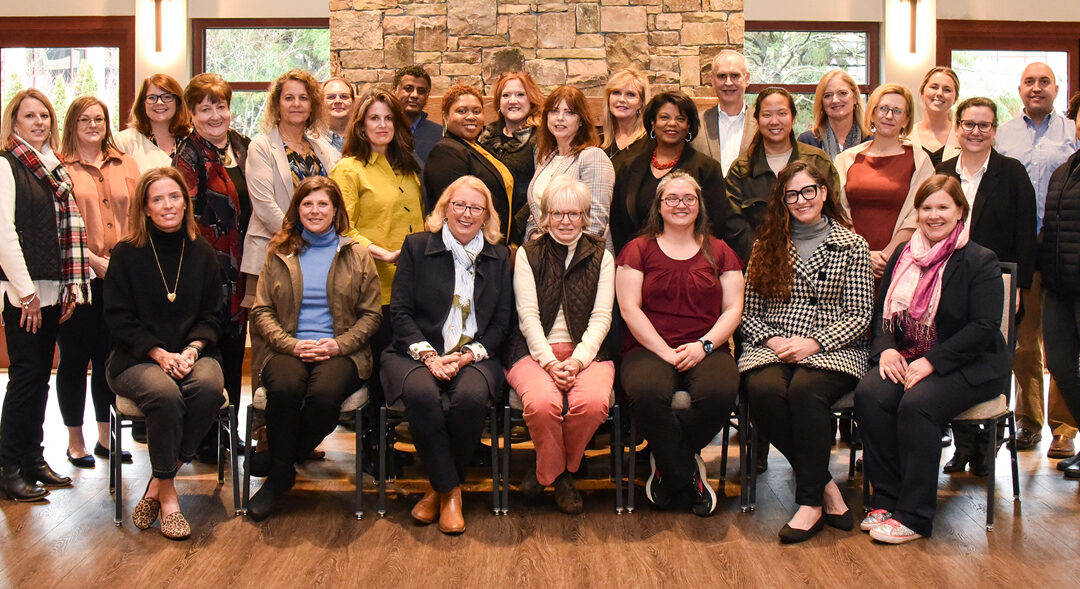
by R-IV PHTC | Feb 7, 2023 | News
The Region IV Public Health Training Center (PHTC) recently hosted members of their Steering Committee. Held in Atlanta, the meeting focused on providing direction for the work of the Center through July 2026.
Members of the Steering Committee include representatives from across the Region IV PHTC network of eight southeastern states including local, state, federal and tribal public health organizations and academia. The Committee also includes staff from the Region IV PHTC Central Office, Community-Based Training Partners, and Technical Assistance Partners.
Representing a diversity of public health perspectives, the role of the Steering Committee is to share information on the training needs of their workforce, speak on behalf of their organizational partners and underserved populations, provide content expertise, and share guidance on Region IV PHTC’s activities.
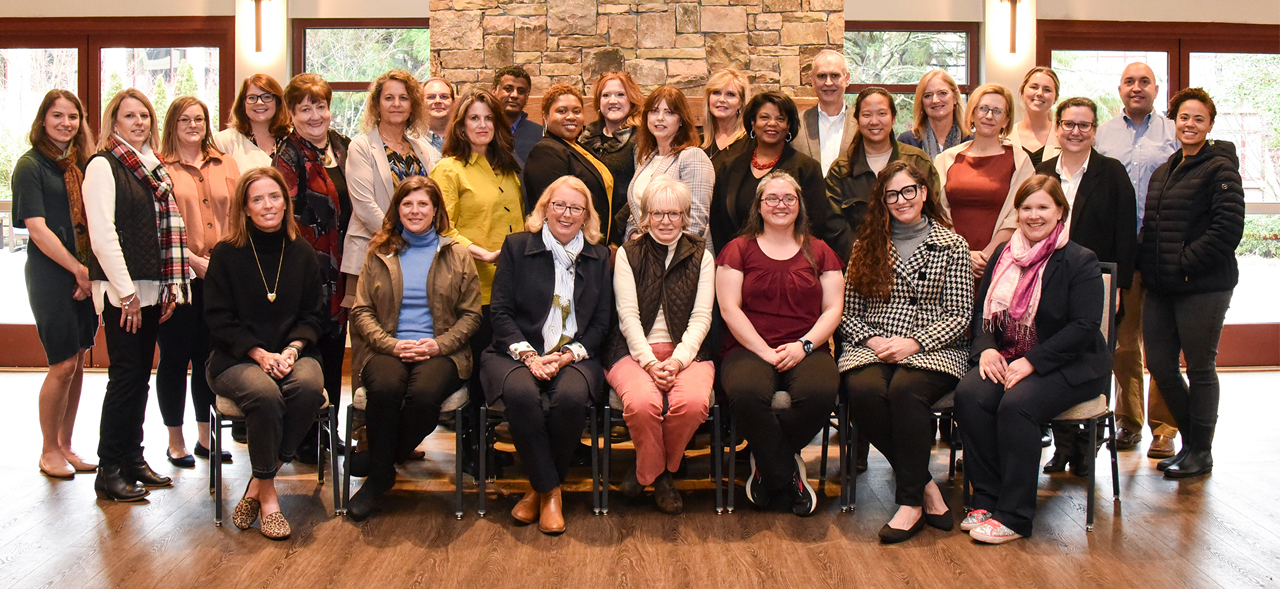
Pictured (front row, left to right): Erin Mundy, Jennifer Bailey, Cynthia Lamberth, Kim Dittmann, Taylor Dula, Janie Cambron, and Kristin Unzicker; (back row, left to right): Elena Kidd, Debra Bragdon, Tara Poole, Becky Reamey, Kaye Bender, Marissa Levine, Matt Fifolt, Susan Haynes Little, Mulugeta Gebregziabher, JacKetta Cobbs, Kris Jones Adcock, Anne Maynard Wenders, Angie Gainey, Yvette Daniels, Ken Harrison, Deanna Zhong, Laura Lloyd, Leslie Meehan, Elizabeth Kidwell, Moose Alperin, Ryan Easterling, and Stacie Schmidt.
Not pictured: Tiffaney Brown, Carolina Darbisi, Lisa McCormick, Keisha McElroy, Andrea Smith, and Brandy Walker.

by R-IV PHTC | Jan 3, 2023 | News
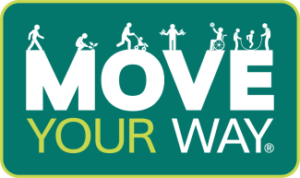 A new year typically coincides with New Year’s resolutions focused on exercising more and/or losing weight. With all the fitness trends and conflicting health advice flooding our news feeds today, it can be hard to grab people’s attention with accessible and evidence-based physical activity messages. The Move Your Way® campaign, developed by the U.S. Department of Health and Human Services (HHS) Office of Disease Prevention and Health Promotion (ODPHP), can help you promote physical activity in your communities.
A new year typically coincides with New Year’s resolutions focused on exercising more and/or losing weight. With all the fitness trends and conflicting health advice flooding our news feeds today, it can be hard to grab people’s attention with accessible and evidence-based physical activity messages. The Move Your Way® campaign, developed by the U.S. Department of Health and Human Services (HHS) Office of Disease Prevention and Health Promotion (ODPHP), can help you promote physical activity in your communities.
The ODPHP developed the Move Your Way® campaign to share key recommendations from the second edition of the Physical Activity Guidelines for Americans. Released in November 2018, the guidelines provide evidence-based guidance to help Americans maintain or improve their health through physical activity. Rather than a one-size-fits-all approach, Move Your Way® emphasizes personalized, practical strategies that people can use to fit more activity into their busy lives, while clearly communicating the amount and types of physical activity Americans need to stay healthy.
You can help spread the word! The Move Your Way® campaign provides online resources – available in English and Spanish – that can be used to help communicate with your audiences about physical activity. The Community Resources page includes campaign materials, a community playbook, and a partner promotion toolkit. Health professionals, organizations, and communities can utilize audience-specific messaging and resources to reach adults, senior adults, parents, kids, and pregnant and postpartum individuals about the importance of physical activity. The materials include fact sheets, posters, videos, social media messages, and interactive tools to motivate people to be more active and start feeling the benefits of physical activity today.
Move Your Way® has been pilot tested in communities across the country! Findings from an outcome evaluation show that reported exposure to Move Your Way® was associated with higher odds of knowing recommended dosages from the Guidelines, likelihood of becoming more active in the future, higher physical activity self-efficacy, and higher physical activity levels. Check out the recently published manuscript: https://profpubs.com/index.php/jheal/article/view/49
To learn more about how public health agencies in North Carolina and Mississippi used the Move Your Way® campaign to support their communities, register for this free webinar on February 17, 2023.
by R-IV PHTC | Dec 12, 2022 | News
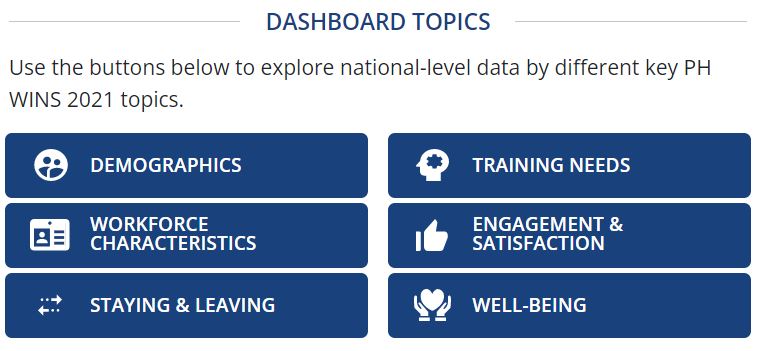
by R-IV PHTC | Sep 19, 2022 | News
The Region IV Public Health Training Center (R-IV PHTC) uses PH WINS data in our ongoing, mixed methods training needs assessment process. The top training needs identified in Region IV by the 2021 PH WINS are: budget and financial management, systems and strategic thinking, community engagement, cross-sectoral partnerships, change management, and policy engagement. The R-IV PHTC Training Catalog, which can be filtered by strategic skill, includes many self-paced learning opportunities on each of these priorities.
More data about the workforce in Region IV is available in this Summary Report. Individuals can also submit data use requests from de Beaumont by using this form.

by R-IV PHTC | Jun 23, 2022 | News
2022-2023 Public Health & Primary Care (PHPC) Leadership Institute
The deadline for applications has passed.
Are you an emerging leader at a state or local health department, tribal health organization, or FQHC/FQHC Look-Alike?
Program Overview
The Region IV Public Health Training Center has partnered with the J.W. Fanning Institute for Leadership Development at the University of Georgia to offer the Region IV Public Health & Primary Care (PHPC) Leadership Institute. The PHPC Leadership Institute provides training for individuals from the eight states that comprise HHS Region IV (Alabama, Florida, Georgia, Kentucky, Mississippi, North Carolina, South Carolina, Tennessee). There is no fee to participate.
The PHPC Leadership Institute is an 8-month experience providing 40 contact hours of interaction. The Institute consists of a virtual orientation; an in-person opening retreat (Oct 31 – Nov 2, 2022; if travel is not safe, there will be a virtual opening retreat 3 hours each day from Oct 31 – Nov 3, 2022); and 6 virtual sessions, lasting 2 hours each. In addition to these sessions, participants will be asked to complete approximately 2-3 hours of intersession work between the virtual sessions.
Who Should Apply
Emerging public health and primary care leaders who:
- Work in governmental state, local, or tribal public health departments, tribal health organizations or FQHCs/FQHC Look-Alikes
- Work in one of the following states: Alabama, Florida, Georgia, Kentucky, Mississippi, North Carolina, South Carolina Tennessee
- Manage programs, supervise staff and/or demonstrate leadership potential
- Work with underserved populations and/or are from under-resourced health departments
The interaction with colleagues from other states and with very varying points of view…. Building connections with my peers was the most useful part. I learned a lot about myself, including challenges that I want to learn to face. The most useful part was learning together and from one another!
– previous Leadership Institute participant
Program Learning Objectives
By the end of the Institute, participants will be able to:
-
- Identify personal leadership strengths
- Address a leadership challenge through a self-directed adaptive approach
- Engage in peer consulting with Region IV colleagues
- Apply leadership competencies in the context of public health
Time Remaining to Apply (with Extended Deadline)
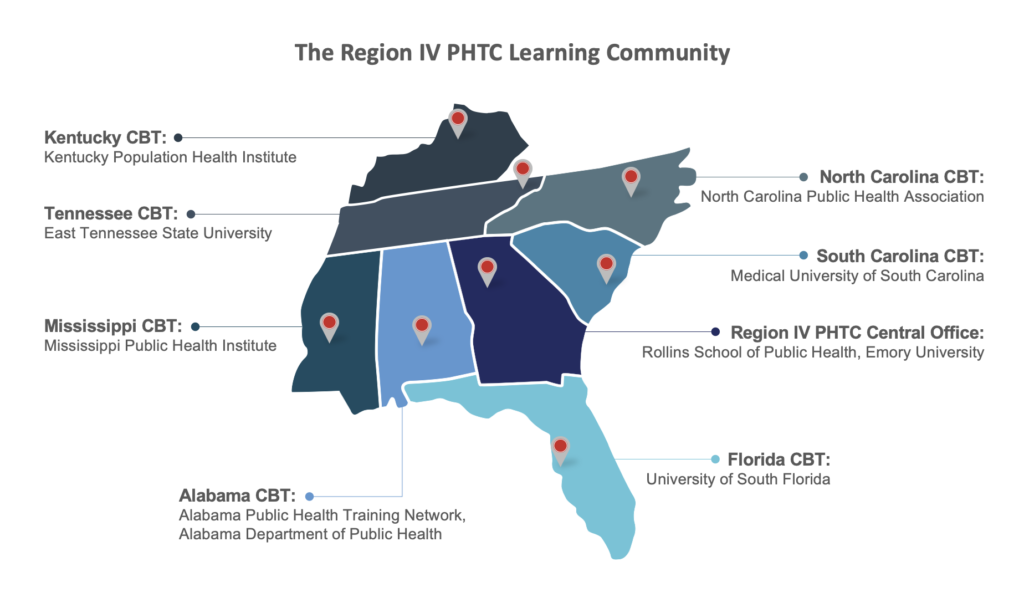
by R-IV PHTC | Jun 7, 2022 | Featured Post, News
The Region IV Public Health Training Center (PHTC) has received a $4.4 million award from the Health Resources and Services Administration (HRSA), a U.S. Department of Health and Human Services (HHS) agency. These funds will be used over the next four years to improve the ability of the public health workforce to meet national, state, and local needs under the direction of Principal Investigator Melissa (Moose) Alperin, EdD, MPH, MCHES.
The new round of funding begins in July 2022. The mission of the Region IV PHTC is to build the capacity of the current and future public health workforce to protect and promote the health of communities in the Southeastern United States. The Region IV PHTC is committed to equitably advancing this mission by: providing priority competency-based trainings and technical assistance to the public health workforce; engaging public health and health profession students in experiential learning opportunities within local communities and medically underserved areas; developing an inclusive learning community with regional partners; supporting a culture of learning within public health agencies; and contributing to the work of the national PHTC program. The Region IV PHTC mission aligns with the HRSA PHTC program’s goals to increase the supply/diversity of public health professionals; enhance the quality of the public health workforce through student field placements; and provide tailored quality training to address current and emerging public health needs.
The Rollins School of Public Health (RSPH) at Emory University has been funded by HRSA as a public health training center since 2010 — first, as the Emory PHTC and then, in 2014 as the Region IV PHTC. The Region IV PHTC, headquartered at the RSPH, includes seven community-based training centers (CBTs) at partnering institutions (Alabama Public Health Training Network, Alabama Department of Public Health; University of South Florida; Kentucky Population Health Institute; Mississippi Public Health Institute; North Carolina Public Health Association; Medical University of South Carolina; and East Tennessee State University) and two technical assistance partners (University of Alabama at Birmingham and the J.W. Fanning Institute for Leadership Development at the University of Georgia). Together the Region IV PHTC network serves eight southeastern states: Alabama, Florida, Georgia, Kentucky, Mississippi, North Carolina, South Carolina and Tennessee. Nine additional Public Health Training Centers also received funded by HRSA to serve other HHS regions across the U.S.
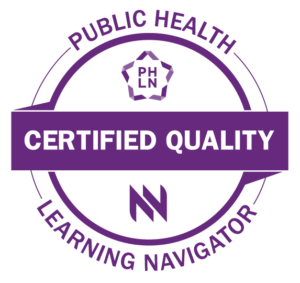
by R-IV PHTC | Feb 23, 2022 | News
R-IV PHTC Trainings Earn Quality Seal
The Learning Navigator Seal is granted to organizations whose trainings have been screened, reviewed, and approved through the Public Health Learning Navigator’s peer Quality Review Process.
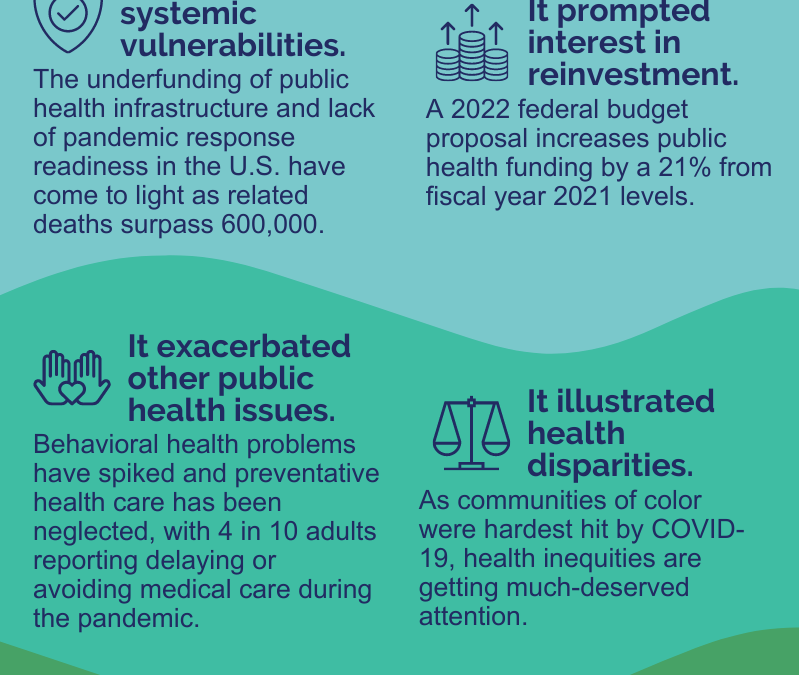
by R-IV PHTC | Jul 1, 2021 | News
From how we work and learn to how we socialize and shop, the COVID-19 pandemic has affected most aspects of our lives as individuals. But how has the pandemic affected the landscape of public health? There’s no shortage of ways—both positive and negative—that the field has been challenged and shaped by the pandemic.

by R-IV PHTC | May 25, 2021 | News
Applications are no longer being accepted for the 2021-2022 cohort.
Are you an emerging leader at a health department or tribal health organization?
Program Overview
The Region IV Public Health Training Center has partnered with the J.W. Fanning Institute for Leadership Development at the University of Georgia to offer the Region IV Public Health Leadership Institute (PHLI). The PHLI provides training for individuals from the eight states that comprise HHS Region IV (Alabama, Florida, Georgia, Kentucky, Mississippi, North Carolina, South Carolina, Tennessee). There is no fee to participate.
The PHLI is an 8-month experience providing 40 contact hours of interaction. The Institute consists of a virtual orientation; a virtual retreat November 1-4, 2021; and 6 virtual sessions, lasting 2 hours each. In addition to these sessions, participants will be asked to complete approximately 2-3 hours of intersession work between the virtual sessions.
Who Should Apply
Emerging leaders who:
- Work in governmental state, local, or tribal public health departments or tribal health organizations
- Work in one of the following states: Alabama, Florida, Georgia, Kentucky, Mississippi, North Carolina, South Carolina Tennessee
- Manage programs, supervise staff and/or demonstrate leadership potential
- Work with underserved populations and/or are from under-resourced health departments
Program Learning Objectives
By the end of the Institute, participants will be able to:
- Identify personal leadership strengths
- Address a leadership challenge through a self-directed adaptive approach
- Engage in peer consulting with Region IV colleagues
- Apply leadership competencies in the context of public health
by R-IV PHTC | Apr 19, 2021 | News
Recent and ongoing horrific incidents in our country have drawn renewed attention to the fact that racism is not only a public health issue, but a public health crisis. The Emory University and the Rollins School of Public Health communities have been swift to respond with statements from leadership and student organizations, vigils and commemorations, resource and reading lists, and educational events.
Here at the Region IV Public Health Training Center, we, too, acknowledge that systematic racism and racist violence continue to hurt our communities and that we are responsible for working to address these tough issues. Specifically, we have taken these steps:
The Region IV Public Health Training Center Anti-Bias and Anti-Racism Commitment
Many of the greatest ideas and discoveries come from a diverse mix of minds, backgrounds and experiences. As a reminder, the Region IV Public Health Training Center welcomes diverse and inclusive interactions and comments from our participants. It is how we learn best. When participating in our trainings, please be respectful of others. Racism, discrimination, microaggressions or hate in any form will not be tolerated. Thank you for helping us sustain a safe, inclusive and respectful learning community.
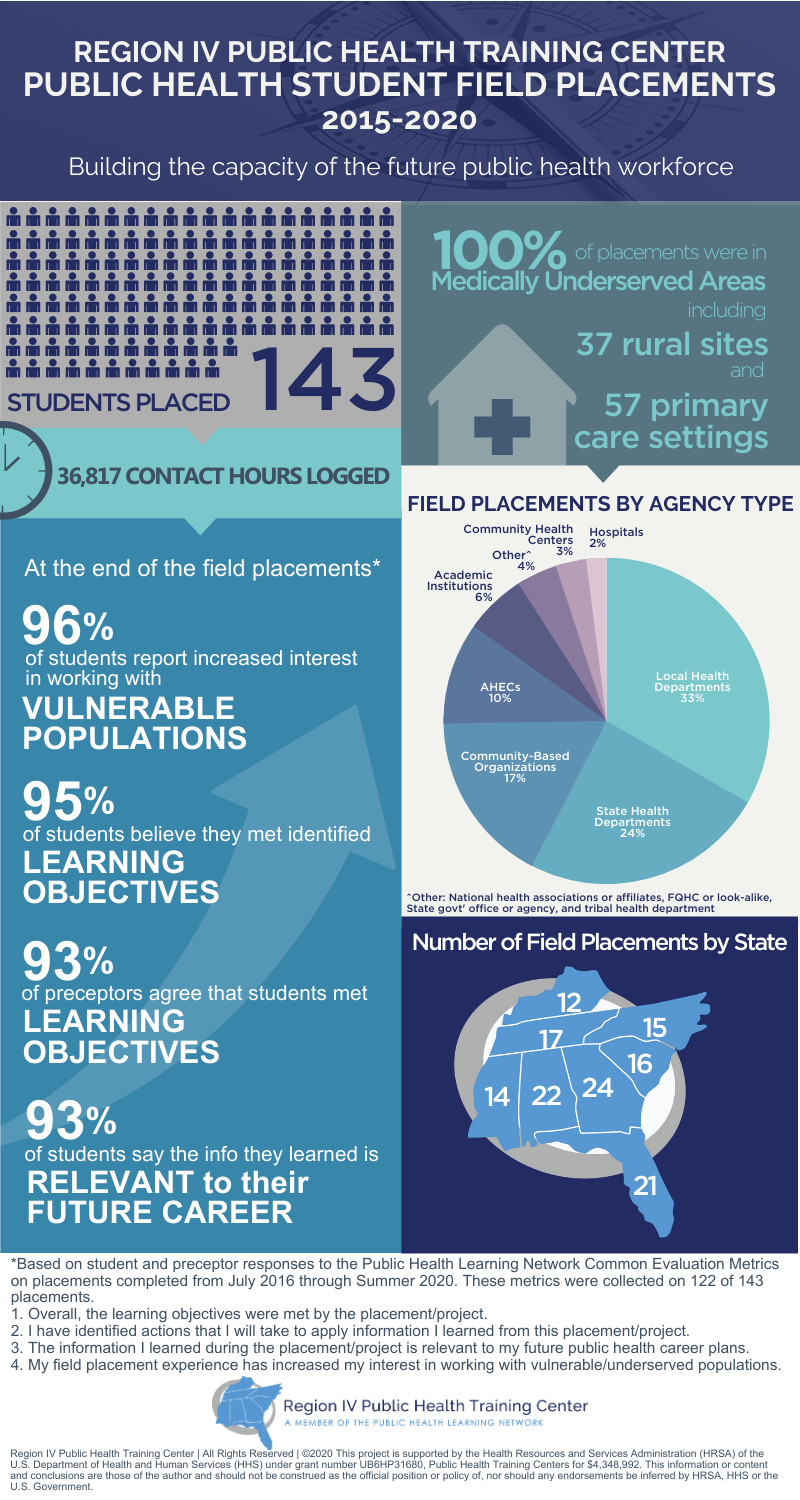
by R-IV PHTC | Mar 10, 2021 | News
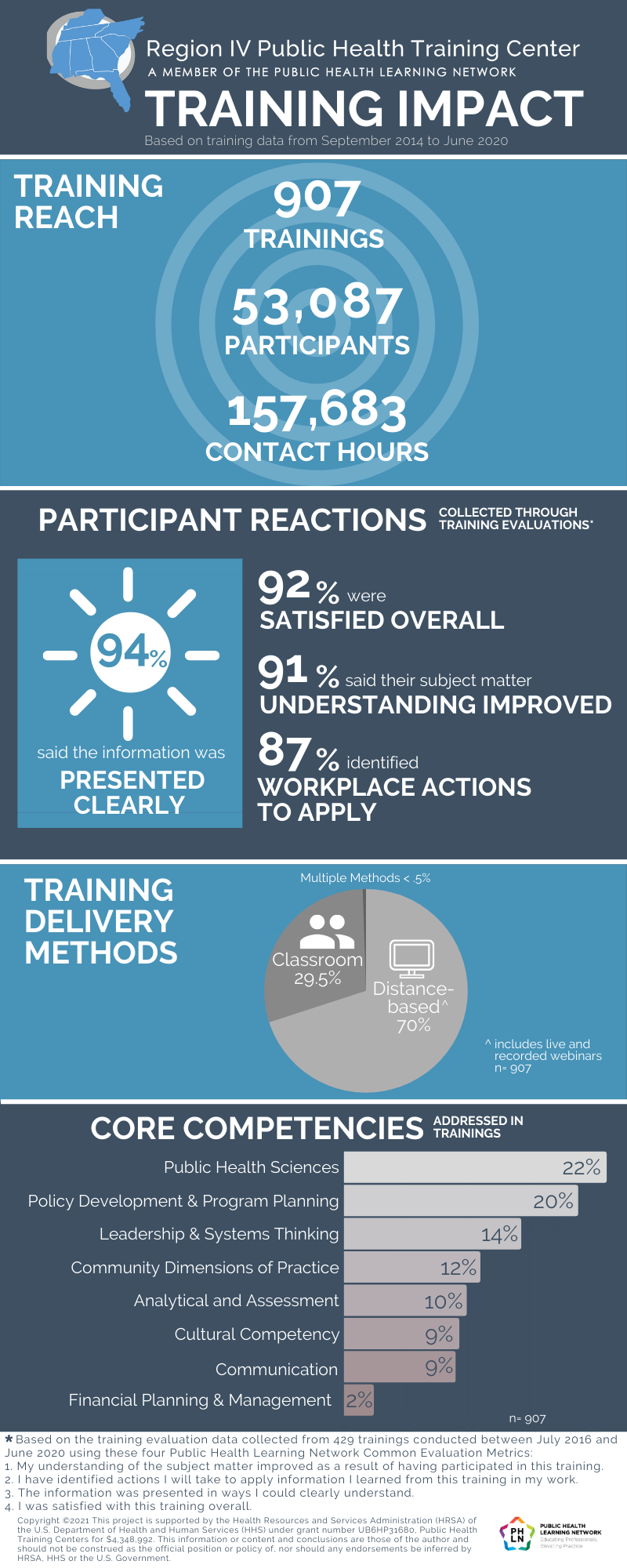
by R-IV PHTC | Mar 10, 2021 | News
The Region IV Public Health Training Center is committed to measuring the impact of our training programs on the public health workforce. The infographic below provides an overview of the reach and evaluation findings from trainings held between September 2014 and June 2020.
by R-IV PHTC | Jan 11, 2021 | News
Today’s public health challenges, like climate change and COVID-19, are complex and require public health professionals to lead large-scale changes that no one person can solve alone. They also require an adaptive public health workforce with diverse knowledge and skills to respond to evolving issues, engage in collective learning, and intervene at organizational, community, and systems levels.
The Public Health Learning Network acknowledges the enormity of this task and has developed a new framework and other tools for doing the work. You can find it all in their new resource, Creating a Learning Agenda for Systems Change: A Toolkit for Building an Adaptive Public Health Workforce.
Recognizing that individual skill building is important but often insufficient for supporting an adaptive workforce, the toolkit helps leaders think beyond training for individual competencies and instead facilitate organizational learning in response to community health needs. The framework embedded in the toolkit helps workforce specialists understand and define public health problems, align the problem with the type of change needed to address it—like increasing knowledge or addressing social norms—and recommend complementary learning strategies to tackle the problem with a vision of addressing systems change.
The toolkit also includes problem-solving tools for moving these concepts into action. The rapid self-assessment helps organizations identify community challenges and examine their current learning state to address them. The discussion guide helps leaders facilitate conversations as they move through each step of the framework. And the learning approach planning tool assists in designing learning opportunities that best fit the community challenge and desired level of impact.
“We want public health leaders and their partners to use this toolkit as a catalyst for their design thinking and planning to change the way their organizations approach learning. This is critical for building learning strategies that can facilitate more ongoing innovation in today’s public health workforce,” said Christina Welter, DrPH, MPH, lead author of the toolkit and associate director for the Policy, Practice, and Prevention Research Center at the University of Illinois at Chicago School of Public Health.
Are you ready to take your organization’s training and learning to the next level? Visit the Public Health Learning Agenda and download a copy of the toolkit today.
Interested and want to know more before you begin? View the on-demand kick-off webinar to hear more about how these concepts and tools fit together and about future pilot testing for the toolkit.
The Public Health Learning Network is a national coalition of 10 Regional Public Health Training Centers and their partners organized to meet public health workforce development needs.
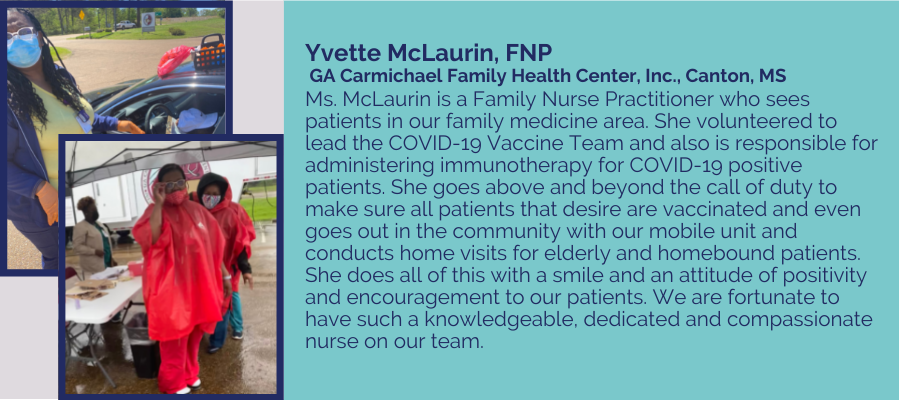
by R-IV PHTC | Dec 15, 2020 | Archive, News
The COVID-19 pandemic has heightened both awareness and scrutiny of the field of public health. Public health professionals have been tasked with responding to the virus in a highly politically charged environment, while also continuing to provide regular programs and services in the challenging circumstances of a pandemic. As a county health department Community Coalition Coordinator explained:
Our health department is handling all things COVID for the county—testing; providing guidance to schools, businesses, employers, agencies, health care providers and the public; investigating and enforcing of state regulations; contact tracing; providing lab results to EVERY single person who takes a COVID test; arranging and providing a multiplicity of testing events that change weekly to meet the current need; and monitoring and assisting people placed in quarantine/isolation to make certain they have what they need and do not violate the order. We also provide shelter and housing and food for people who have no safe place to quarantine or isolate. As employees of the health department we are considered first responders and throughout this crisis are constantly being pulled away from our regular work. I have so much work to do and so very little time. Just because COVID-19 came to town does not mean all of the other health problems went away.
In this new photo blog, Portraits of Public Health, the Region IV Public Health Training Center seeks to highlight and appreciate the folks who have been and continue to do the hard work of public health. To nominate a public health professional to be included, please use this form. Priority will be given to nominees from Region IV.

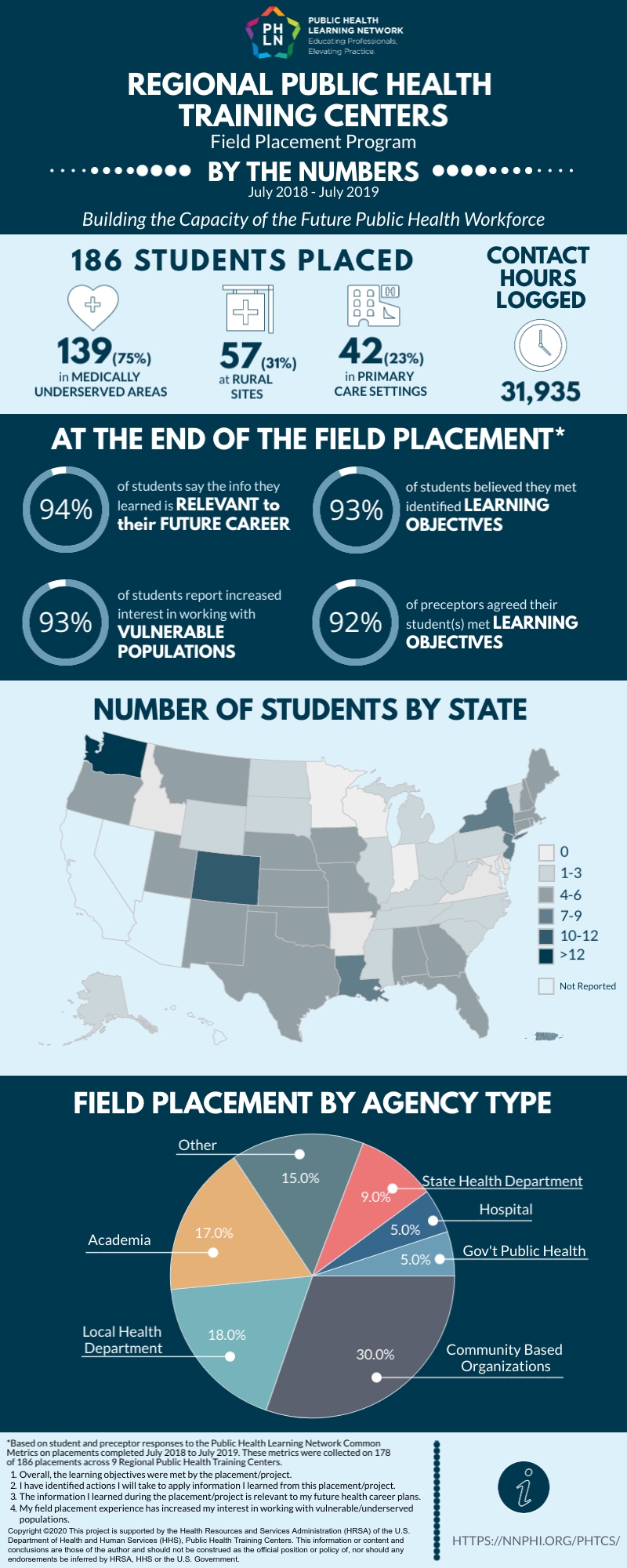
by R-IV PHTC | Aug 26, 2020 | Archive, News
When you participate in a training with the Region IV Public Health Training Center, you become a key part of a national network (the Public Health Learning Network, or PHLN) of ten regional Public Health Training Centers, each funded by the Health Resources and Services Administration to strengthen the public health workforce through education and training.
The PHLN is committed to measuring and communicating the influence of our programming. Two new infographics (below) highlight the collective impact and value of the PHTCs activities at a glance. The compiled data highlight the tremendous effort of the PHTCs in designing trainings that clearly communicate relevant public health information in such a way that participants are not only satisfied with the training, but are also able to learn from the trainings and identify actions they can take in their workplace. Likewise, across all regional field placements, the strength and impact of the PHTC field placement program is evident.

by R-IV PHTC | Jun 8, 2020 | Archive, News
Applications are no longer being accepted for the 2020-2021 cohort.
Are you an emerging leader at a health department or tribal health organization?
Program Overview
The Region IV Public Health Training Center has partnered with the J.W. Fanning Institute for Leadership Development at the University of Georgia to offer the Region IV Public Health Leadership Institute (PHLI). The PHLI provides training for individuals from the eight states that comprise HHS Region IV (Alabama, Florida, Georgia, Kentucky, Mississippi, North Carolina, South Carolina, Tennessee). There is no fee to participate.
The PHLI is an 8-month experience providing 40 contact hours of interaction. The Institute consists of a virtual orientation; a virtual retreat November 2-6, 2020; and 6 virtual sessions, lasting 1½ hours each. In addition to these sessions, participants will be asked to complete approximately 2 hours of intersession work between the virtual sessions.
Who Should Apply
Emerging leaders who:
- Work in governmental state, local, or tribal public health departments or tribal health organizations
- Work in one of the following states: Alabama, Florida, Georgia, Kentucky, Mississippi, North Carolina, South Carolina Tennessee
- Manage programs, supervise staff and/or demonstrate leadership potential
- Work with underserved populations and/or are from under-resourced health departments
Program Learning Objectives
By the end of the Institute, participants will be able to:
- Identify personal leadership strengths
- Address a leadership challenge through a self-directed adaptive approach
- Engage in peer consulting with Region IV colleagues
- Apply leadership competencies in the context of public health

by R-IV PHTC | May 4, 2020 | Archive, News
In response to the 2020 pandemic, The Region IV Public Health Training Center’s Public Health Practice Academy skills-based workshops will now be offered online only, until further notice. Space in these no-cost workshops is very limited (~25 participants per class) and priority enrollment is for staff of local, state and tribal health departments in Region IV (AL, FL, GA, KY, MS, NC, SC, TN). Only register if you are confident that you can participate.
These online Public Health Practice Academy workshops are not webinars. They are interactive, and learners are expected to actively participate and share their audio and video. Each participant will need a computer with webcam, microphone, speakers and internet access.
Topics include data analytics, persuasive communications, practical evaluation, program planning, conflict management, holistic leadership, health equity, human resource management and strengths-based leadership.

by R-IV PHTC | Mar 20, 2020 | Archive, News
The nation’s Regional Public Health Training Centers serve the governmental public health workforce, a group of professionals who, under normal times, are generally overstretched and under-resourced. As the U.S. confronts the 2020 COVID-19 pandemic, these individuals deserve extra support of all kinds: emotional, instrumental and informational. The Region IV Public Health Training Center, with its network of almost 9,000 public health professionals, is uniquely poised to facilitate supportive connections between those on the frontlines of COVID-19.
Who is eligible to participate?
The Communities of Support initiative is designed for staff of local, tribal and state health departments. Priority will be given to those working in Region IV: Alabama, Florida, Georgia, Kentucky, Mississippi, North Carolina, South Carolina, and Tennessee. Others will be considered if resources allow.
What will Community of Support participation look like?
This will largely be determined by group members. Communities can stick with group email threads, or switch to another mode of communication (text, Zoom, WhatsApp, Slack, etc.). These communications will be informal and private to the community members. All community members are expected to participate in some capacity and should participate as much as they like or can.
Who will be in my Community of Support?
Region IV Public Health Training Center staff will create groups of 2-8 public health professionals. Members will be matched based on the preferences they indicate during the registration process, to the greatest extent possible. Participants will have the opportunity to indicate if they prefer to be matched with others within or outside of their discipline, geographic location and agency type.
When will Communities of Support begin and end?
Participants will be recruited beginning March 23, 2020. Communities will be formed starting March 30, 2020. Communities may be continue to be created after that date if staff capacity permits. For the time being, this iniative has an open end date.
What support will the Region IV Public Health Training Center provide?
Each group will be assigned a technical assistance (TA) contact from the Region IV Public Health Training Center. The TA contact will start a group email thread for each Community of Support. The TA contact will provide 1-2 weekly prompts (introductions, discussion questions, resources, self-care tips, etc.) to get and keep community conversations going. The TA contact will check in with participants periodically to see how their experience has been and will also be available if someone needs to be reassigned or otherwise needs technical assistance.
If you have any questions prior to registering, please contact hilary.merlin@emory.edu.
Community of Support members can help one another get through this current challenge.
- Coach
- Learn
- Mentor
- Share
- Support
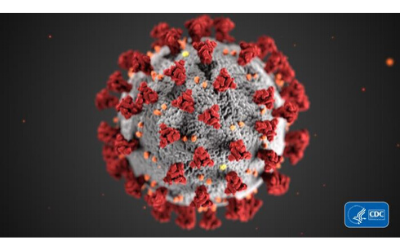
by R-IV PHTC | Mar 5, 2020 | Archive, News
CENTERS FOR DISEASE CONTROL AND PREVENTION (CDC)
STATE-SPECIFIC INFORMATION FROM HEALTH DEPARTMENTS IN HHS REGION IV
RELATED TRAININGS FROM THE REGION IV PUBLIC HEALTH TRAINING CENTER

by R-IV PHTC | Oct 14, 2019 | Archive, News
The Region IV Public Health Training Center’s Public Health Practice Academy is a collection of in-person, skills-based workshops for both new and seasoned public health professionals. We offer a limited number of these classes at local, state and tribal health departments in Region IV (AL, FL, GA, KY, MS, NC, SC, TN). While we are not able to fulfill every request we receive, we would like to hear from you if you are interested in bringing a workshop to your health department. Contact us for more information.
The most recent additions to the Public Health Practice Academy series include:
- 5 Voices of Leadership: Transforming Team Communication
- Data Analytics for Public Health
- Managing Change in Public Health
- Persuasive Communication in Public Health: Influencing Patients, Partners and the Public
- Seeking Health Equity: Understanding and Taking Action on the Root Causes of Health Disparities
by R-IV PHTC | May 13, 2019 | Archive, News
The Region IV Public Health Training Center has partnered with the J.W. Fanning Institute for Leadership Development at the University of Georgia to offer the Region IV Public Health Leadership Institute (PHLI). The PHLI provides training for individuals from across the eight states that comprise HHS Region IV (Alabama, Florida, Georgia, Kentucky, Mississippi, North Carolina, South Carolina, Tennessee). There is no fee to participate.
The PHLI is an 8-month experience providing 40 contact hours of interaction. The Institute consists of a virtual orientation, one in-person 3-day retreat, and 6 virtual sessions, lasting 1½ hours each. In addition to these sessions, participants will be asked to complete approximately 2 hours of intersession work between the virtual sessions.
Applicant Criteria
- Employed by state, local or tribal public health departments/tribal health organizations
- Work in one of the following states: Alabama, Florida, Georgia, Kentucky, Mississippi, North Carolina, South Carolina Tennessee
- Manage programs, supervise staff and/or demonstrate leadership potential
Program Learning Objectives
By the end of the Institute, participants will be able to:
- Identify personal leadership strengths
- Address a leadership challenge through a self-directed adaptive approach
- Engage in peer consulting with Region IV colleagues
- Apply leadership competencies in the context of public health
by R-IV PHTC | Dec 18, 2018 | Archive, News
Are you ready to give your professional development a jump start in 2019? These customizable, three-part worksheets can help you identify and prioritize your learning needs and then craft a plan for meeting them. They are based on the de Beaumont Strategic Skills for the Governmental Public Health Workforce as well as the The Council on Linkages Core Competencies for Public Health Professionals.
Select the plan below that matches your professional tier, download the editable document, and get started!
Professional Development Plan for Tier One Public Health Professionals (Front Line Staff/Entry Level) >>
Professional Development Plan for Tier Two Public Health Professionals (Program Management/Supervisory Level) >>
Professional Development Plan for Tier Three Public Health Professionals (Senior Management/Executive Level) >>
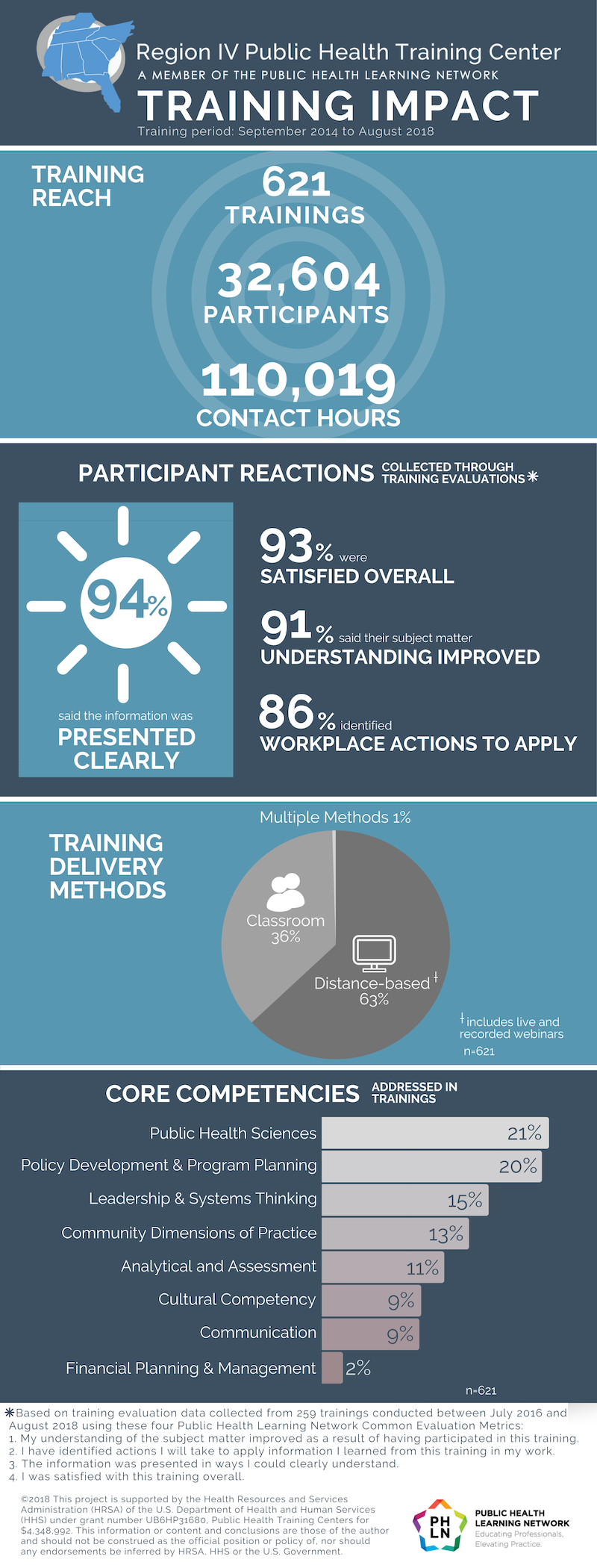
by R-IV PHTC | Oct 23, 2018 | Archive, News
The Region IV Public Health Training Center is committed to measuring the impact of our training programs on the public health workforce. The infographic below provides an overview of the reach and evaluation findings from trainings held between September 2014 and August 2018.

by R-IV PHTC | Sep 14, 2018 | Archive, News
These trainings on hurricanes and their aftermath have been produced by the Region IV Public Health Training Center or other members of the Public Health Learning Network.
These trainings on hurricanes and their aftermath have been produced by other organizations.
A recommended list of Resources for Public Health Response to Hurricanes and Their Aftermath is also available.
by R-IV PHTC | Sep 14, 2018 | Archive, News, Uncategorized
As the Atlantic hurricane season intensifies, public health agencies may be involved in critical preparedness and recovery efforts. The Region IV Public Health Training Center recommends these related resources.
From the Centers for Disease Control and Prevention—Natural Disasters and Severe Weather, which includes
From the HHS Office of the Assistant Secretary for Preparedness and Response—Hurricane Florence 2018, which includes
- Preparedness and Planning
- During a Hurricane
- Following a Hurricane
- Resources for Response Workers
From the National Association of County and City Health Officials—Hurricane Season Ready: Preparedness and Response Resources, which includes
- Local Health Departments’ Role in in Hurricane and Flooding Response and Recovery
- Post-Hurricane and Flooding
- Vector-Control
- Mental/Behavioral Health
- Food and Water Safety
- Risk and Emergency Communications
- Volunteering and Donations
- Federal Resources and Guidance
A list of hurricane-related trainings from Region IV Public Health Training Center, the Public Health Learning Network and other organizations is also available.

by R-IV PHTC | Jul 2, 2018 | Archive, Featured Post, News

Moose Alperin, Principal Investigator/Project Director
The Region IV Public Health Training Center (PHTC) has been awarded a $4.3 million grant from the Health Resources and Services Administration (HRSA), a U.S. Department of Health and Human Services (HHS) agency. These funds will be used over the next four years to improve the ability of the public health workforce to meet national, state, and local needs under the direction of Principal Investigator Melissa (Moose) Alperin, EdD, MPH, MCHES.
The new round of funding begins in July 2018 and calls for an increased focus on training in three primary skill areas: systems thinking, change management and persuasive communication. These are three of the strategic skills identified by the National Consortium for Public Health Workforce Development and the de Beaumont Foundation in the report “Building Skills for a More Strategic Public Health Workforce: A Call to Action.” Additionally, trainings will be offered based on state needs and priority health concerns, including mental health, opioid use and childhood obesity. The new funding also increases emphasis on student field placements, which aim to increase the number of skilled public health professionals working in rural and/or underserved communities.
The Rollins School of Public Health (RSPH) at Emory University has been funded by HRSA as a public health training center since 2010 — first, as the Emory PHTC and then, in 2014 as the Region IV PHTC. The Region IV PHTC, headquartered at the RSPH, includes seven community-based training centers (CBTs) at partnering institutions (Alabama Public Health Training Network, Alabama Department of Public Health; Florida Agriculture and Mechanical University; University of Louisville; Mississippi Public Health Institute; University of North Carolina Wilmington; Medical University of South Carolina; and East Tennessee State University) and three technical assistance partners (University of Alabama at Birmingham, University of Georgia, and the National Network of Public Health Institutes). Together the Region IV PHTC network serves eight southeastern states: Alabama, Florida, Georgia, Kentucky, Mississippi, North Carolina, South Carolina and Tennessee. Nine additional Public Health Training Centers also received funded by HRSA to serve other HHS regions across the U.S.
The Region IV PHTC Learning Community
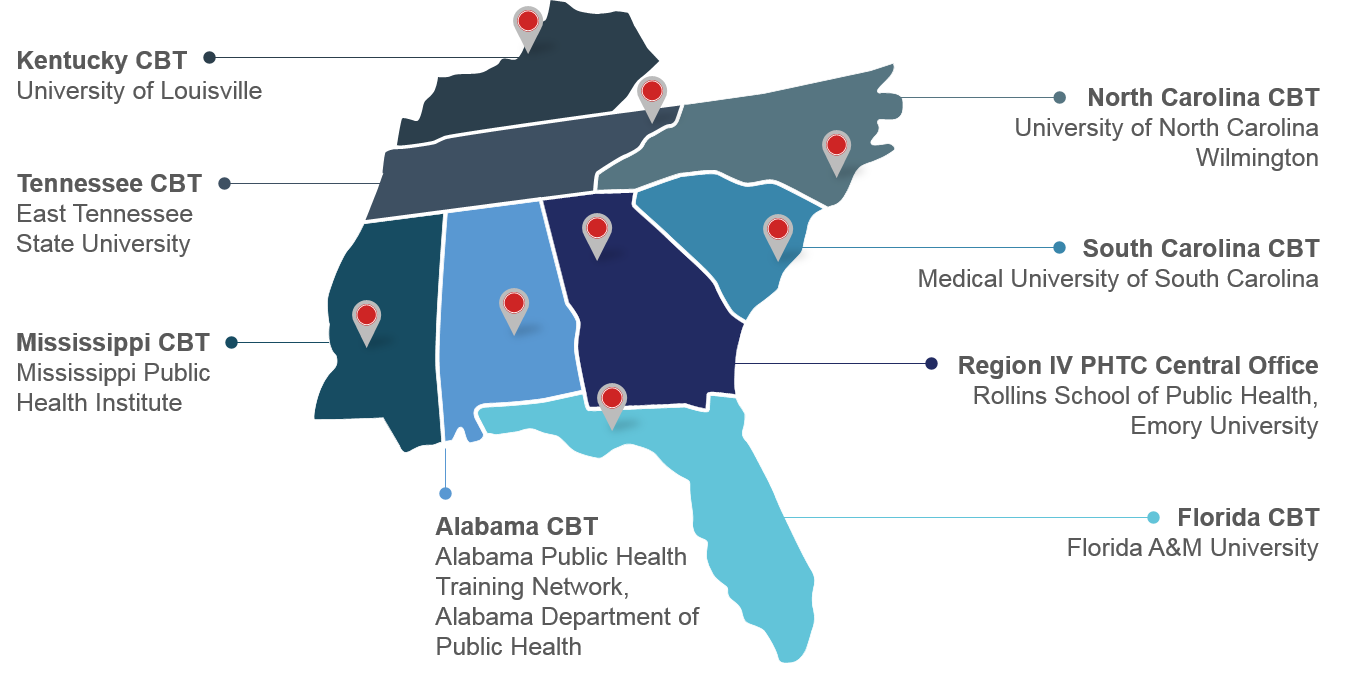
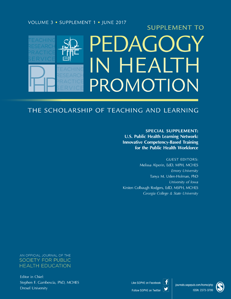
by R-IV PHTC | Aug 1, 2017 | Archive, News
 The June 2017 supplement to Pedagogy in Health Promotion: The Scholarship of Teaching and Learning highlights the innovative activities of the 10 regional Public Health Training Centers, 40 local performance sites and the National Coordinating Center that comprise the Public Health Learning Network (PHLN). The supplement, titled “U.S. Public Health Learning Network: Innovative Competency-Based Training for the Public Health Workforce,” contains 12 articles, three commentaries, and a guest editorial by Dr. Karen B. DeSalvo, former Acting HHS Assistant Secretary for Health, about the role of the PHLN in implementing the Public Health 3.0 framework. Specific activities described in the supplement include training needs assessment, workforce development training, technical assistance for the the public health workforce, and field placements.
The June 2017 supplement to Pedagogy in Health Promotion: The Scholarship of Teaching and Learning highlights the innovative activities of the 10 regional Public Health Training Centers, 40 local performance sites and the National Coordinating Center that comprise the Public Health Learning Network (PHLN). The supplement, titled “U.S. Public Health Learning Network: Innovative Competency-Based Training for the Public Health Workforce,” contains 12 articles, three commentaries, and a guest editorial by Dr. Karen B. DeSalvo, former Acting HHS Assistant Secretary for Health, about the role of the PHLN in implementing the Public Health 3.0 framework. Specific activities described in the supplement include training needs assessment, workforce development training, technical assistance for the the public health workforce, and field placements.
R-IV PHTC Director of Operations Moose Alperin, EdD, MPH, MCHES, served as a guest editor. Pedagogy in Health Promotion is a publication of the Society for Public Health Education. The entire supplement is accessible online at no charge for one year, and some articles are approved for CHES or MCHES continuing education credits.

by R-IV PHTC | Jun 23, 2017 | Archive, News
As a public health professional, you may be wondering if advocacy has a role in your life. The answer is YES! Here’s what you can do.
Understand your professional responsibility. Public health professionals have a duty to use their expertise and influence to advocate for public health. Advocating for policies and programs that improve health is a fundamental function and core competency of public health professionals.
—
Stay informed. Policy and budget proposals are changing every day. Follow the news and these national public health organizations to know when your help is critically needed.
—
Don’t assume all advocacy activities are off limits. Advocacy is taking action to build support for an issue or cause. Many advocacy activities are compatible with employers’ policies, in particular educating policymakers and constituents. Lobbying is a type of advocacy that involves contacting policymakers by phone, email, in-person or otherwise to try to influence their position on specific legislation.
—
Know your agency. Some organizations prohibit employees from lobbying (not advocacy) altogether. Others have a process in place for approving lobbying activities. Check with your organization’s human resources or public affairs department to clarify.
—
Act as a concerned citizen. As a private citizen, you generally are free to contact elected officials on your own time, using your own resources to share your personal views. When acting as an individual, you may use your credentials (MPH, RN, MD, etc.), but not your organizational affiliation. Research suggests that in-person visits and individualized emails/letters are more influential phone calls and form emails. When reaching out about a public health matter, consider contacting your Senator or Representative’s Health Legislative Assistant.
FIND YOUR SENATOR FIND YOUR REPRESENTATIVE

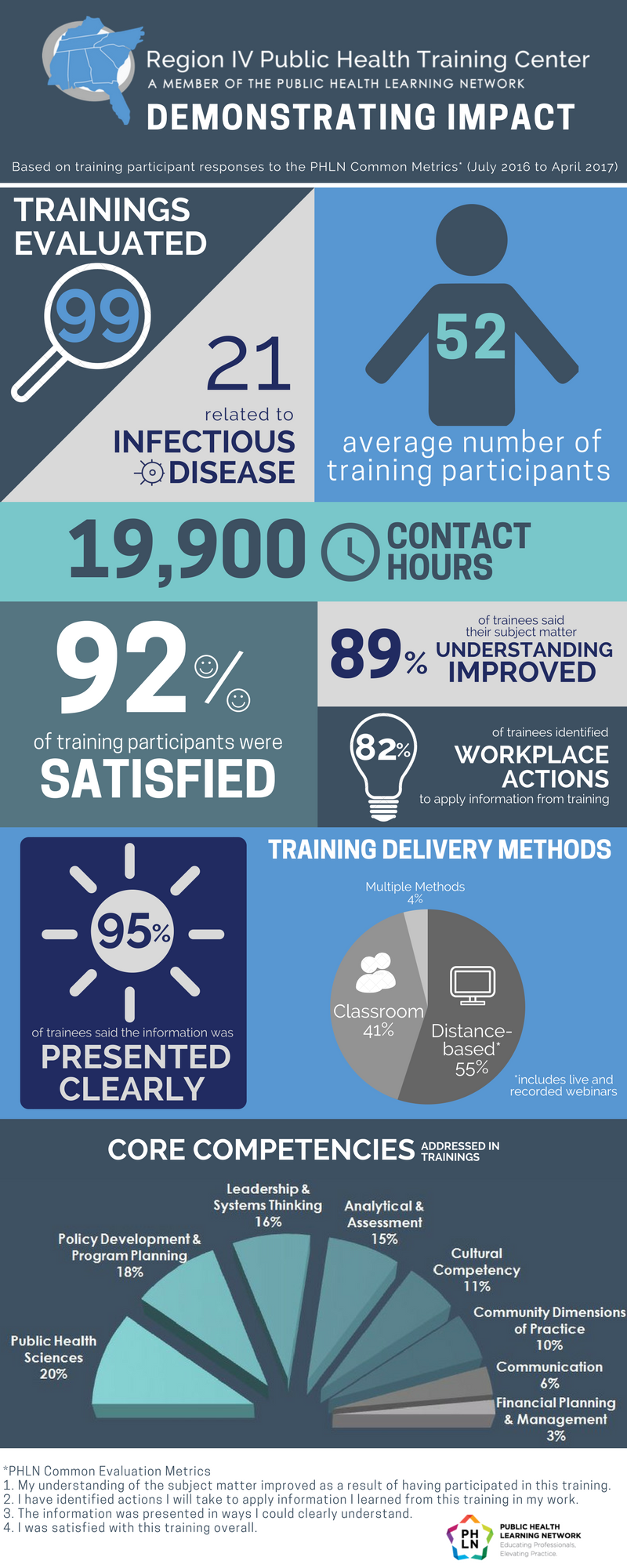
by R-IV PHTC | May 25, 2017 | Archive, Featured Post, News
The Region IV Public Health Training Center is committed to measuring the impact of our training programs on the public health workforce. The infographic below provides an overview of the evaluation findings from our most recent trainings (July 2016-April 2017).

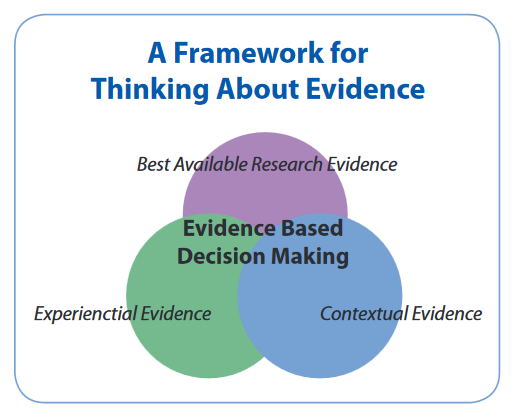
by R-IV PHTC | Feb 22, 2017 | Archive, News
Evidence-based practices improve health outcomes, maximize limited resources, and enhance workforce productivity.

This image, from CDC’s Understanding Evidence, highlights three distinct sources of evidence that influence decision making in public health. While research evidence is extremely important and should not be overlooked, it is not the only kind.
When public health programs lack evidence of effectiveness, we may use other explanations to defend our work: We’ve always done it that way or People love it. However, in order to protect the integrity of the public health profession, we should uphold science and evidence-based public health practice. Trained public health practitioners rely on the best available knowledge about what works–and what doesn’t–when making decisions about public health programs and policies. They rely on scientific research to inform their priorities and select strategies with demonstrated benefits.
Ready to learn more? Explore the resources below and join our March 6, 2017 webinar.
Selected Resources for Finding Evidence-Based Programs
For a more comprehensive list, click here.
by R-IV PHTC | Apr 1, 2016 | Archive, News
CDC is excited to announce the launch of the newly designed CDC Learning Connection – your source for information on public health training opportunities developed by CDC, CDC partners, and other federal agencies. Visit the new site, access thousands of free courses, and sign up for monthly email updates.
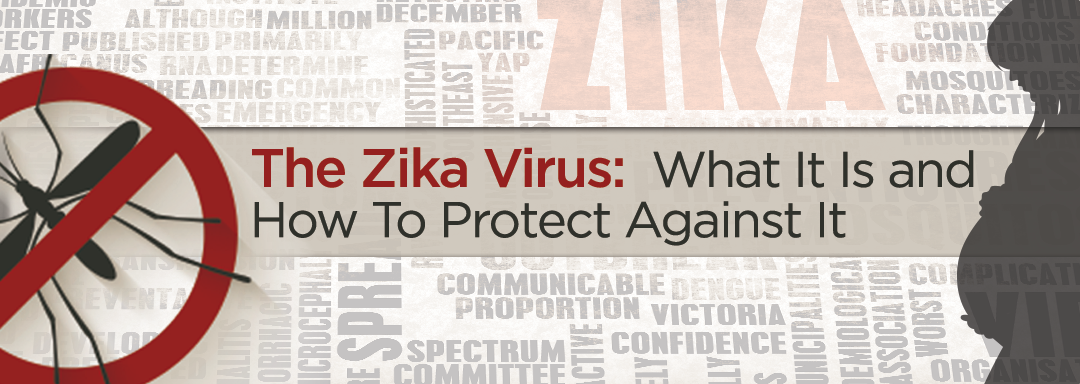
by R-IV PHTC | Mar 15, 2016 | Archive, Featured Post, News
This is a listing of archived training materials for public health professionals on the Zika virus, including recorded webinars and live presentations sponsored by the Region IV Public Health Training Center.
Zika Virus Symposium: Zika: Z to A: What We Know, What We Don’t, and How to Prepare
This event was sponsored on June 10, 2016 by MUSC’s South Carolina Clinical and Translational Research (SCTR) Institute, Johns Hopkins University, South Carolina Department of Health and Environmental Control (DHEC), MUSC Center for Global Health, Johns Hopkins Project Restore and MUSC’s Department of Public Health Sciences.
ASPR TRACIE: Zika Resources at Your Fingertips
This document provides Zika virus disease resources and an overview of public health and healthcare system considerations and implications that are applicable to professionals in those systems, emergency management stakeholders, and other audiences.
The Region IV Public Health Training Center sponsored a webinar, “Protecting the Public from Mosquito-borne Illnesses: Zika” with Beth P. Bell, MD, MPH.
The Region IV Public Health Training Center sponsored a webinar, “The Zika Virus: What It Is and How to Protect Against It” with Cherie Drenzek, DVM, MS, State Epidemiologist, Georgia Department of Public Health.
Zika Virus Challenge 2016
The University of Alabama at Birmingham School of Public Health sponsored the Zika Virus Challenge 2016 Training on February 15, 2016. This recorded video of a live presentation will provide general background on the Zika virus and mosquito vectors and discuss responses to similar outbreaks.
U.S. DEPARTMENT OF HEALTH AND HUMAN SERVICES ZIKA VIRUS HEALTH INFORMATION RESOURCES
by R-IV PHTC | Feb 8, 2016 | Archive, News
Protecting Americans from Infectious Diseases
The Outbreaks: Protecting Americans from Infectious Diseases report found that more than half (28) of states scored a five or lower out of 10 key indicators related to preventing, detecting, diagnosing and responding to outbreaks. Five states—Delaware, Kentucky, Maine, New York and Virginia—tied for the top score, achieving eight out of 10 indicators. Seven states—Idaho, Kansas, Michigan, Ohio, Oklahoma, Oregon and Utah—tied for the lowest score at three out of 10.
The report, from TFAH and the Robert Wood Johnson Foundation (RWJF), concluded that the United States must redouble efforts to better protect the country from new infectious disease threats, such as MERS-CoV and antibiotic-resistant superbugs, and resurging illnesses like whooping cough, tuberculosis and gonorrhea.
READ THE FULL ARTICLE AT TRUST FOR AMERICA’S HEALTH»
Related Infectious Disease Trainings
[ecs-list-events cat=’infectious-disease-infection-prevention’ eventdetails=’false’ limit=’10’]










